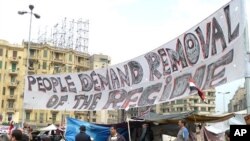A steady flow of protesters converged on Cairo's Tahrir Square again Wednesday, while some spread to new areas, with new supporters joining the demonstrations. Continuing government concessions seem not enough to bring the opposing sides any closer.
New positions
Some demonstrators have moved out from Tahrir Square, taking up positions in front of Egypt's parliament. They vow not to stand down until President Hosni Mubarak and the government do the same.
New groups are taking up the anti-government banner. Factory and government workers are making an appearance, demanding higher wages. And some unions are joining in, with workers striking in other parts of the country, from Helwan, south of Cairo, to Suez.
Key demands
The political protesters' key points remain the same: an overhaul of the government system, with real constitutional change and an end to the emergency law, which has allowed for arbitrary arrest, detention and alleged torture for nearly 30 years.
Mohamed Ismail, a doctor who has been helping tend to the protesters, says he has no trust in the government's concessions so far.
Ismail does not believe the constitution will be reformed as promised, because the current parliament, he says, is a fraud. He adds the government will not lift the emergency law because of the new excuse of the protests.
The doctor says the two sides are deadlocked.
Not that Egypt's government is oblivious to the demonstrations, now in their third week, and authorities say, costing the country more than $300 million a day.
Government response
State media announced Wednesday that authorities have released 34 political prisoners. Among them are members of the banned Muslim Brotherhood, whose leadership is engaged in unprecedented dialogue with the government.
But as for the core demand, Vice President Omar Suleiman said again late Tuesday that President Mubarak is not going to step down. Suleiman warned that the only alternative to the dialogue underway is a coup.
But as the government digs in, so too, do the protesters.
Another doctor on the square dismisses the argument that if Mr. Mubarak leaves, chaos would ensue.
Kamal Abu Sena urges the president to live with dignity and "abdicate," as he put it. There will be no chaos, he says, adding, suppose Mr. Mubarak dies in the morning? He argues there are laws and institutions and "lots of honest people" who can protect the country.
Slideshow of photos from Tahrir Square




